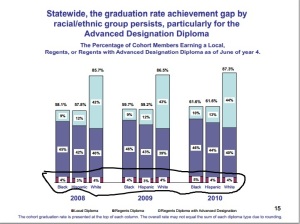This White Suburban Mom has a few thoughts to share with Michael Petrilli of the Fordham Institute on his latest 9 Questions on what it means to oppose Common Core. Now, Petrilli is addressing the GOP presidential candidates who brought up their opposition while in Iowa. I certainly am not among that group. But, I have had it with his snarky comments when it comes to the children’s lives he is so caviler about.
- Do you mean that you oppose the Common Core standards themselves? All of them? Even the ones related to addition and subtraction? Phonics? Studying the nation’s founding documents? Or just some of them? Which ones, in particular, do you oppose? Have you actually read the standards? Petrilli needs to stop acting like Common Core invented education. It did not. He learned all these skills without Common Core and so did millions of other people that came through the public education system.
- Or do you mean that you oppose the role that the federal government played in coercing states to adopt the Common Core? Fair enough, but don’t you share that exact same position with every Republican in Congress and every other Republican running for president, including Jeb Bush? It is one thing to adopt bad policy, or to buy into bad policy. It is another thing to stick with it when it is not working. Federal involvement in education, including Common Core, is causing more problems then it is fixing.
- Do you mean that you think states should drop out of the Common Core? States like Iowa? Isn’t that a bit presumptive, considering that you’re not from Iowa and the state’s Republican governor wants Common Core to stay? The Republican governor in Iowa may still be buying into Common Core, but not everyone is. There is a Stop Common Core movement there which means, politically, Iowa will like Common Core until it is political suicide to not like Common Core
- If you do think that states should reject the Common Core, which standards should replace them? Do they need to be entirely different, or just a little bit different? And could you cite a specific example of a standard that needs to be “different? Petrilli stated that Indiana had better standards then Common Core, so how about those? You also stated that, since Indiana had “flat test scores” that Common Core would offer a better path. Well, in New York, our scores dropped tremendously. So, maybe the standards and the tests are all politically manipulated? So, the whole “standards” movement is smoke and mirrors.
- Or do you mean that you oppose the way Common Core has been implemented? If so, everywhere, or just in some states? Or just in some schools? You are running for president; do you think the president of the United States has a role in fixing Common Core implementation? Yes, definitely, the federal government should not have coerced the states to implement Common Core, and Petrilli has published articles agreeing with that. The role the President should play in fixing Common Core? Disband the US Department of Education. The USDOE has betrayed the public trust under Duncan’s administration. There can be an Education branch under the Department of Health And Human Services to write reports and distributed IDEA funds. And that is it.
- Do you mean you oppose any standards in education that cross state lines? Several years ago, the governors came to an agreement about a common way to measure high school graduation rates. Do you oppose that, too? How many standards did not cross state lines before Common Core? Because, from where I am sitting the governors endeavored to allow Pearson to build an education monopoly, and I think there are anti-trust laws for that.
- Or do you mean that you oppose any standards, even those set at the state level? Since states have the constitutional responsibility to provide a sound education, don’t you think they should be clear about what they expect students to know and be able to do in the basic subjects? Most of the states had as good or better “standards” prior to common core. And, standards based education completely disregards the flexibility required for SPED students. I would propose frameworks, not standards, flexibility for SPED (and ELL) students (that is one of the factors in improved graduation rates that we will lose under Common Core rigor) and enough with the over priced, politically manipulated, unfunded standardized testing.
- Or do you mean that you oppose standards that aim to get young people ready for college or a good-paying career? Do you think that’s too high a standard? What standard would you prefer? I have spent time talking to teachers and administrators in New York and what we are going to to see a major increase in drop out rates. The standards are too weak for the high achieve students and too inflexible for students who struggle in a standard education environment. Standards that preclude capable students from being able to get a high school diploma at all, do not serve this country.
- Tell us again: Why do you oppose the Common Core? The standards are developmentally inappropriate at in the elementary years. They are burning students out at a young age. Common Core is unfair to SPED students and to ELL students. You cannot reasonably expect a student who does not speak English to achieve standards at the same level as a native born American. SPED students need flexibility to work through their educational needs so that they can have success as it applies to them. College is not the goal for everyone. That is fine. But, students need a high school diploma to get any kind of job, like sanitation worker, truck driver, hair stylist. Common Core is an obstacle for too many, in too many ways.



